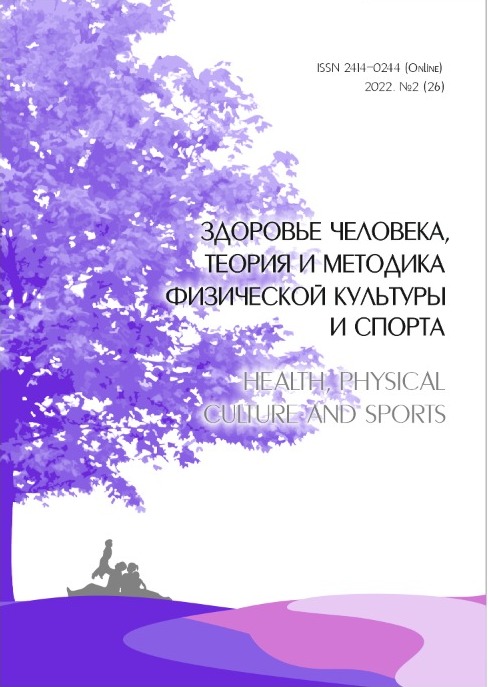HEALTH AND STRENGHT: ETICAL ASPECTS
Abstract
INTRODUCTION. The author turns to the consideration of such a component of health as strenght, noting that there is no rigid connection between strenght and health, just as there is no rigid connection between strenght and vectors of culture-creativity, goodness. The PURPOSE OF THE STUDY is to identify the morally significant aspects of strenght. Since the concept of "strenght" is not yet among the ethical terms reflected in the domestic reference and philosophical literature (specifically, in “Dictionary of Ethics”; “Ethics: Encyclopedic Dictionary”), the author undertakes an independent analysis of the main components of strenght, such as the subject-bearer of strenght, the particular strenght, the context in which strenght is manifested, the experience, comprehension, realization of strenght, result, attitude toward the result. THE MATERIAL of the discussion is the folk wisdom reflected in the proverbs of different peoples about strength, as well as various philosophical texts from different traditions of thought. The legacy of such thinkers as Aristotle, Pascal, Kant, Dostoevsky, and Frankl, among others, is authoritative and productive for the unfolding discourse. METHOD OF STUDY – ethical analysis. Based on a brief examination of the identified key components of strength, it is possible to identify the leading morally significant characteristics of strength. For the subject-bearer of force (whether individual or community), what matters is FREEDOM, DIGNITY, and WILL. For a particular force (which can be directed either toward action or toward avoidance of tensions), it is the MORAL CHOICE and CONSCIENCE. The context in which force manifests itself is characterized, first of all, by the MORAL ASSESSMENT, THE TRAINNESS, THE CAPACITY OF SPIRIT. The subject's experience of the presence / absence of various manifestations of power must be characterized by the CULTURE Of FEELINGS. To comprehension – there should be an OBJECTIVE EVALUATION of what is happening and SELF-EVALUATION. To the realization of power – MORAL MEASUREMENT, MUTUAL RESPECT, HONESTY, FIDELITY TO ONE'S WORD. The most significant ethical characteristics of the result are JUSTIСE, CONSENSUS, LIFE CALLING, and THE ABILITY TO SELF-DISCLOSE. Finally, the subject's attitude to the result manifests itself in SELF-IMPROVEMENT and CULTURE-CREATION. The results of the reasoning appear as a multidimensional morally meaningful matrix of strenght. CONCLUSIONS: the considered generalized situation of the manifestation of strenght can contribute to the collective understanding of the vectors and mechanisms of human culture.
Downloads
References
Армянский фольклор. – М.: Наука, 1979. – 375с.
Афганские народные пословицы и поговорки. – М.: Изд-во иностранной литературы, 1961. – 66с.
Афоризмы // https://www.aphorism.ru/comments/2gp21t9wm4.html – обращение 13.2.22
Воробьёв В. Медвежья история // «АиФ», № 26, 1998.
Высказывания знаменитых людей. – М.: КРОН-ПРЕСС, 2000. – 470 c.
Гальего Рубен Давид Гонсалес. Белое на чёрном. – СПб. – Москва: Лимбус-Пресс, 2005. – 221с.
Гварджаладзе И.С., Мчедлишвили Д.И. Английские пословицы и поговорки. – М.: Высшая школа, 1971. – 77с.
Граф А.Е. Словарь немецких и русских пословиц. – СПб.: Лань, 1997. – 287с.
Даль В.И. Толковый словарь живого великорусского языка. В 4-х томах. Т.4. – М.: Гос. издательство иностранных и национальных словарей, 1956. – 683с.
Достоевский Ф.М. Братья Карамазовы // https://ilibrary.ru/text/1199/p.36/index.html – обращение 13.2.22
Древнеиндийские афоризмы. – М.: Наука, 1966. – 96с.
Иоанн Златоуст, Святитель. Слава Богу за всё: Сб. писем. – М.: Издание Сретенского монастыря, 2005. – 350с.
Кант И. Критика способности суждения. – М.: Искусство, 1994. – 367с.
Кант И. Лекции по этике. – М. : Республика, 2005. – 431с.
Корейские народные изречения. На корейском и русском языках. – М.: Главная редакция восточной литературы, 1982. – 359с.
Курдские пословицы и поговорки. – М.: Главная редакция восточной литературы, 1972. – 456.
Курилов С. Один в океане: история побега. – М.: Время, 2015. – 233с.
Малкин Г. Живым из жизни не уйти. – М.: ООО «Гамма-С.А.» ООО «Гамма Пресс 2000», 2000. – 319с.
Монгольские народные пословицы и поговорки. – М.: Изд-во иностранной литературы, 1962. – 86с.
Панибратов В.Н. Закон и муза: Избранное (Философия. Поэтика. Поэзия) – СПб.: Изд-во РГПУ им. А.И. Герцена, 2008. – 399с.
Паскаль Б. Мысли. – Москва: «REFL- book», 1994. – 523с.
Пословицы абхазского народа. – Сухуми: АГУ, 1994. – 74с.
Пословицы народов мира. – СПб.: Изд-во «Глосса», 1995. – 159 с.
Сад камней: Мудрость Китая и Японии. – СПб.: Паритет, 2005. – 318 с.
Сициньский А. Замечания по поводу понятия «потребности» // Проблемы формирования социогенных потребностей. – Тбилиси: Мецниереба, 1981. – С.67-71.
Сказки, пословицы и песни лужицких сербов. – М.: Изд-во иностранной литературы, 1962. – 159с.
Словарь по этике. – М.: Политиздат, 1989. – 448с.
Словарь русского языка: В четырёх томах. Т.4. – М.: Русский язык, 1984. – 792с.
Собрание мыслей Достоевского. – М.: Звонница – МГ, 2003. – 621с.
Современная отечественная афористика. – М.: Изд-во АСТ, 2002. – 541с.
Твардовский А.Т. Что нужно, чтобы жить с умом? // https://stihi-russkih-poetov.ru/poems/aleksandr-trifonovich-tvardovskiy-chto-nuzhno%2C-chtoby-zhit-s-umom%3F – обращение 13.2.22
Толковый Словарь Русского Языка // https://www.vedu.ru/expdic/31729/ – обращение 13.2.22
Франкл В. Человек в поисках смысла. – М.: Прогресс, 1990. – 367с.
Чакалов И.В. Пословицы и поговорки цалкинских (триалетских) греков. – Салоники: Эродиос, 1997. – 216с.
Этика: Энциклопедический словарь. – М.: Гардарики, 2001. – 669с.
An author should not normally publish manuscripts describing essentially the same research in multiple journals or publication venues. Such redundant publication is generally considered to constitute unethical publishing behavior, and if discovered may result in a manuscript under consideration being rejected, or a published article being retracted.
Authors of manuscripts reporting on original research should present an accurate account of the work performed, accompanied by an objective discussion of its significance. Underlying data should be represented accurately in the manuscript. The manuscript should contain sufficient detail and references to permit others to replicate the work. The fabrication of results and the making of fraudulent or knowingly inaccurate statements constitute unethical behavior and may be cause for rejection or retraction of a manuscript or published article.





